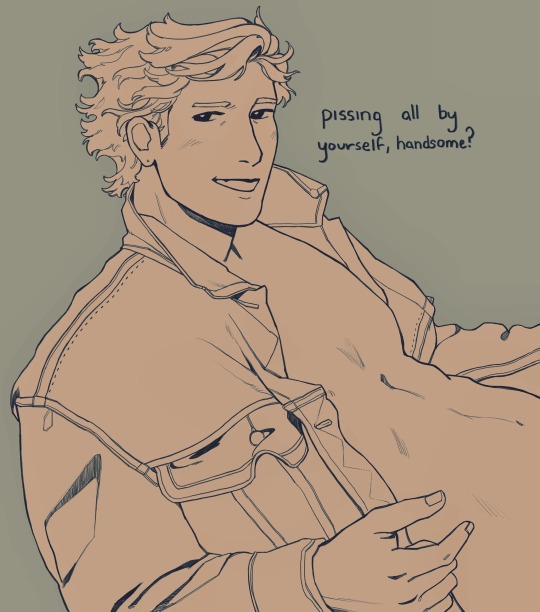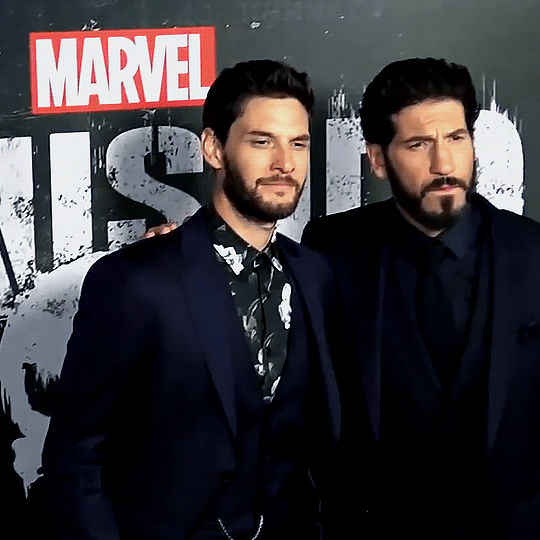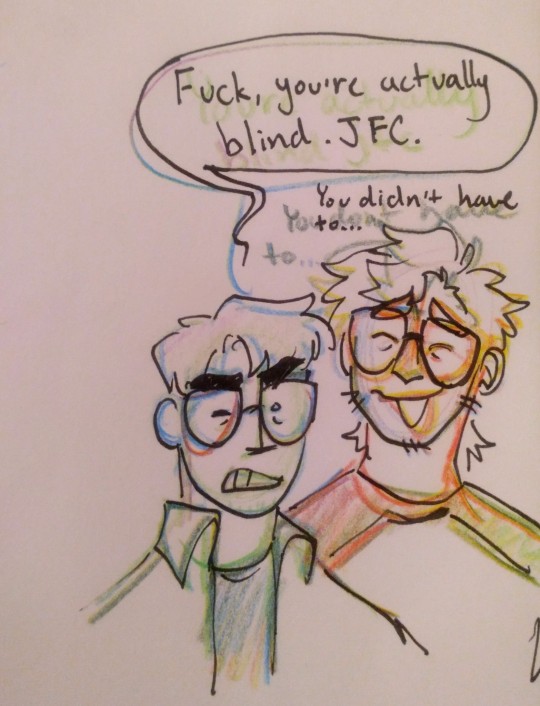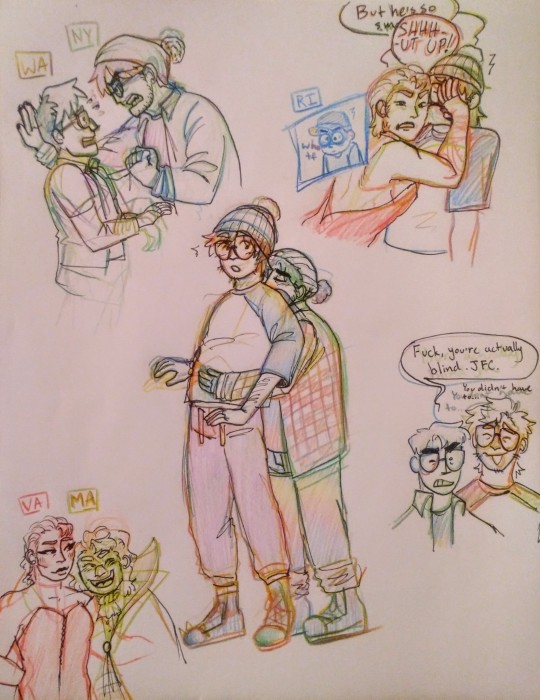#ben rhodes
Text
Fate has placed Taiwan and Ukraine in similar positions. Both have giant neighbors who once ruled them as imperial possessions. Both have undergone democratic transformations and have thus become an ideological danger to the autocrats who covet their territory. Just as Putin has made the erasure of Ukraine’s sovereignty central to his political project, Xi has vowed to unify China and Taiwan, by force if necessary. Secretary of State Antony Blinken warned in October that China may be working on a “much faster timeline” for dealing—somehow—with Taiwan. U.S. military and intelligence leaders have pointed to 2027 as a potential time frame for an invasion, believing that China’s military modernization will have advanced sufficiently by then.
— Taiwan Wants China to Think Twice About an Invasion
#ben rhodes#taiwan wants china to think twice about an invasion#current events#politics#taiwanese politics#chinese politics#imperialism#intelligence#russo-ukrainian war#2022 russian invasion of ukraine#taiwan#ukraine#china#russia#antony blinken
127 notes
·
View notes
Text
The apologists for Putin's Russia – both Trumpsters and tankies – say that Ukraine must "negotiate" an end of Putin's illegal invasion.
Those folks are either oblivious to Russia's recent history of negotiations or are intentionally ignoring that history for political reasons.
In the years leading up to Russia's full-scale invasion of Ukraine, diplomats lost their authority, their role reduced to echoing the Kremlin's aggressive rhetoric.
BBC Russian asks former diplomats, as well as ex-Kremlin and White House insiders, how Russian diplomacy broke down.
This was four month's before the invasion.
In October 2021, US Undersecretary of State Victoria Nuland went to a meeting at the Russian foreign ministry in Moscow. The man across the table was Russia's Deputy Foreign Minister Sergei Ryabkov, who Ms Nuland had known for decades and always got along with.
Mr Rybakov's American counterparts saw him as a practical, calm negotiator - someone they could talk to even as the two countries' relationship frayed.
This time, things were different.
Mr Ryabkov read Moscow's official position from a piece of paper and resisted Ms Nuland's attempts to start a discussion. Ms Nuland was shocked, according to two people who discussed the incident with her.
She described Mr Ryabkov and one of his colleagues as "robots with papers", the people said (the State Department declined to comment on the incident).
And outside the negotiating room, Russian diplomats were using increasingly undiplomatic language.
"We spit on Western sanctions."
"Let me speak. Otherwise, you will really hear what Russian Grad missiles are capable of."
"Morons" - preceded by an expletive.
These are all quotes from people in positions of authority at the Russian Ministry of Foreign Affairs in recent years.
If you are thinking that this doesn't sound like serious negotiating, you are entirely correct.
This attitude didn't begin in 2021, it's been ongoing since at least 2007.
The first signal that a new Cold War was beginning came in 2007 with a speech Mr Putin made to the Munich Security Conference.
In a 30-minute diatribe, he accused Western countries of attempting to build a unipolar world. Russia's diplomats followed his lead. A year later, when Russia invaded Georgia, Moscow's Foreign Minister Sergei Lavrov reportedly swore at his UK counterpart, David Miliband, asking: "Who are you to lecture me?"
Western officials still thought it was worth trying to work with Russia. In 2009, Mr Lavrov and the then-US Secretary of State Hillary Clinton pressed a giant red "reset button" in relations, and the two countries seemed to be building co-operation - especially on security issues.
But it soon became obvious to US officials that their Russian counterparts were simply parroting Mr Putin's growing anti-Western views, says Ben Rhodes, deputy national security advisor to former US President Barack Obama.
Mr Rhodes recalls President Obama having breakfast with Mr Putin in 2009, accompanied by a folk orchestra. He says Mr Putin was more interested in presenting his view of the world than discussing co-operation and that the Russian leader blamed Mr Obama's predecessor, George W Bush, for betraying Russia.
As the Arab Spring, the US involvement in Libya, and the Russian street protests unfolded in 2011 and 2012, Mr Putin decided that diplomacy wouldn't get him anywhere, Mr Rhodes says.
"On certain issues - Ukraine in particular - I did not get the sense that [diplomats] had much influence at all," says Mr Rhodes.
The arrival of Maria Zakharova as spokesperson for Russia's Foreign Ministry in 2015 signaled another deterioration in diplomacy.
[W]ith Ms Zakharova's arrival, foreign ministry briefings became a spectacle. Ms Zakharova often yelled at reporters who asked her difficult questions and responded to criticism from other countries with insults.
Her diplomatic colleagues were going the same way. Mr [Boris] Bondarev, who used to work for Moscow's mission to the UN in Geneva, recalls one meeting where Russia blocked all proposed initiatives, prompting colleagues from Switzerland to complain.
"We said to them: 'Well, what's the problem? We are a great power, and you are just Switzerland!'
"That's [Russian] diplomacy for you," he says.
Getting back to the eve of the invasion. (emphasis added)
Mr Bondarev recalls a dinner in Geneva in January 2022 when Mr Ryabkov, from the foreign ministry, met US officials. US First Deputy Secretary of State Wendy Sherman hoped to avert the invasion of Ukraine through 11th-hour negotiations.
"It was awful," says Mr Bondarev. "The Americans were like, 'Let's negotiate.' And instead Ryabkov starts shouting, 'We need Ukraine! We won't go anywhere without Ukraine! Take all your stuff and go back to the 1997 [Nato] borders!' Sherman is an iron lady, but I think even her jaw dropped at this.
"[Ryabkov] was always very polite and really nice to talk to. And now he's banging his fist on the table and talking nonsense."
The war hasn't changed things.
Ukrainian authorities complain that Russia is once again offering ultimatums instead of compromises, such as demanding that Ukraine accepts the annexation of occupied territories. Kyiv has no intention to negotiate under such conditions, and its Western allies publicly support this decision.
Russia seems set on relying on its military machine, intelligence services and geo-economic power for influence - rather than diplomacy.
Some people won't like hearing this, but the only way to end this war is militarily.
Judy Dempsey is a nonresident senior fellow at Carnegie Europe and editor in chief of Strategic Europe. At Carnegie Europe she writes:
Negotiations can only begin if Ukraine’s President Volodymyr Zelensky is in a strong enough position to set the terms. Those terms are not just about restoring Ukraine’s territorial integrity. They are about ensuring that Russia does not attack or threaten Kyiv again. An end to the war is about ending Russia’s imperial ambitions in this part of Europe.
[ ... ]
It is not enough for leaders and defense ministers to say ad nauseam that they will support Ukraine “for as long as it takes” or that Ukraine must win. How is that going to happen if the country is not provided with the essential military equipment? And if there are mutterings in some Europeans capitals and in Washington that the Ukrainian offensive has not been quick enough or effective enough, the reason is that Ukraine lacks the military support to achieve it.
[ ... ]
The war is a test for Europe in particular and the West in general. It is about security, conviction, and trying to uphold values based on the pursuit of democracy. Ultimately, that’s what the Ukrainians are fighting for.
A fudged compromise will damage the West and appease—indeed embolden—Russia and its supporters.
Exactly. This is not just an unprovoked war against Ukraine, it's a war against the West and liberal democratic values.
#invasion of ukraine#diplomacy#negotiations#russia's war of aggression#russian imperialism#sergei lavrov#vladimir putin#maria zakharova#victoria nuland#sergei ryabkov#boris bondarev#judy dempsey#hillary clinton#wendy sherman#ben rhodes#россия#русский мiръ#агрессивная война россии#владимир путин#путин хуйло#сергей лавров#сергей рябков#борис бондарев#руки прочь от украины!#союз постсоветских клептократических ватников#геть з україни#вторгнення оркостану в україну#україна переможе#слава україні!#героям слава!
14 notes
·
View notes
Link
24 notes
·
View notes
Text

“Imagine having your home destroyed just because of who you are. And that being the point.”
#ben rhodes#free palestine#palestine#politics#world news#israel#news#human rights#jerusalem#west bank#gaza
3 notes
·
View notes
Photo

(link)
3 notes
·
View notes
Quote
Every scholar, expert, experienced person, journalist - foreign and domestic - that you read, who talks about the way to fight fascism, says that you need to built the largest coalition possible, from the socialists to the Never Trump Republicans.
You don't have to love Liz Cheney. You don't have to like her dad, or think the war in Iraq was a good fucking idea, to think she's running a good hearing. Can we all just be adults and hold two things in our heads at one time? ...
If I was living in 1930s Germany, and the Social Democrats weren't getting along with the Conservatives, and were like, "We can't possibly unite with them against this guy Hitler and their crackpot group of extremists," I'm sure those people lived to regret that. I want anyone who wants to fight the fascists to be a part of this emergency movement.
Tommy Vietor and Ben Rhodes, Pod Save the World, “Jesus take the wheel (before Trump does)”
#this quote spoke to me on a spiritual level and i needed to share it#leftists are so good at circling the wagons and shooting inward#mine#jan 6 hearings#jan 6 committee#anti fascist#equality#politics#pod save the world#tommy vietor#ben rhodes
4 notes
·
View notes
Text

NASCAR Truck Series 2023 ʳᵒᵘⁿᵈ ²³ Phoenix 🇺🇸
Ben Rhodes wins his 2nd Truck Series championship. 🏆

1 note
·
View note
Text
🎵 Why does the Truck Series have a Chase? 🎵


I think the racing gods crafted this abomination of a race entirely to vent their disgust at what Phelps said. Undoubtedly a top 2 worst championship finish in Truck Series history, and the only reason it's even close is because 2003 happened (that's a whole other rabbit hole). I could go on about how badly Grant Enfinger and GMS got robbed (I have all the respect in the world now for him), Hocevar and especially Heim throwing their incredible talents out the window and letting their behavior ruin the title (although at least Carson owned up to his goof afterward), how hilariously Rhodes almost choked just when the title looked completely secured, and how NASCAR's asinine playoff format, their loose overtime rules, and the quickly decaying culture of the Truck Series (which DEMANDS intervention from NASCAR themselves) combined for this trainwreck of a finale, but far smarter people than me have already given this disaster the ripping it deserves.
So instead I'll deposit this idea. If NASCAR does ever miraculously think about bringing back a season-long points format (which considering how even the ratings have been hurt by the playoffs, I think it's safe to say they have no real good reason not to at this point), maybe they should test the waters by eliminating the Truck Series playoffs for a few years (much like how Trucks and Xfinity went over a decade with no Chase from 2004-15), and if it all works out, then axe it in Xfinity and Cup and we can finally move on from this mess of a system. I know it's kind of a pipe dream, but we gotta start somewhere.
*sigh* Well, congrats to Ben Rhodes. It's honestly super impressive how he not only scrapped in at Homestead through a tiebreaker and a gutsy pit call, but also survived all the chaos of the ending and his decaying truck to claim his second Truck Series title in two years, even if his own mistake involving Zane nearly ruined it all in the end. He and especially Grant were the two most respectable performers last night and he got into the right spot to survive the system. A ring is a ring, so I hope he enjoys it. Don't hate the players, hate the dumb stupid game they play.

At least we got another drunk Rhodes interview out of this. So i guess that's something.
youtube
#nascar truck series#nascar craftsman truck series#craftsman 150#phoenix raceway#nascar championship weekend#the playoffs do not deserve the tag#nascar#poor enfinger#grant enfinger#ben rhodes#drunk ben rhodes
0 notes
Text

Two turntables and a microphone.
0 notes
Text


0 notes
Text
Criticism of President Biden’s “New Cuba Policy”
Criticism of President Biden’s “New Cuba Policy”
On May 16, 2022, the White House held a press briefing on what it called “Our New Cuba Policy.” After examining the details of that briefing, we will evaluate that so called “New Policy” and conclude that it is inadequate by failing to call for elimination of (a) the U.S. embargo of Cuba and (b) the U.S. designating Cuba as a “state sponsor of terrorism.”
U.S. “New Cuba Policy”[1]
The “new”…
View On WordPress
#"State Sponsor of Terrorism"#Ben Rhodes#Brazil#Bruno Rodriguez Parrilla#Colombia#Cuba#Cuba Family Reunification Parole Program#Cuban emigrants#Fikncimex#Hurricane Ian#Israel#Ned Price#oil storage tanks (Matanzas Cuba)#President Barack Obama#President Donald Trump#President Dwight D. Eisenhower#President Joe Biden#Professor William LeoGrande#Rodney Hunter#Scott Hamilton#Secretary of State John Kerry#Secretary of State Michael Pompeo#U.N. General Assembly#U.S. Department of Homeland Security#U.S. embargo of Cuba#U.S. Embassy (Havana Cuba)#U.S. Foreign Relations Committee#U.S. President Donald Trump#U.S. remittances to Cuba#U.S. Secretary of State Michael Pompeo
0 notes
Text
How did we get to this point? The origin story of Taiwan most familiar to Americans begins in 1949, when Chiang Kai-shek’s nationalist forces, locked for years in a civil war with Mao Zedong’s Communists, were defeated. Along with much of his remaining army, Chiang fled to Taiwan and set up a government-in-exile called the Republic of China. That government was recognized by the United States. But within a few years of Richard Nixon’s 1972 Cold War opening to Beijing, the U.S. formally switched diplomatic recognition to the People’s Republic. Ever since, Taiwan’s status has been cloaked in ambiguity. The U.S. acknowledges Beijing’s claim to Taiwan without recognizing its sovereignty over the island. To help deter a Chinese effort to seize Taiwan by force, the U.S. has pledged to provide Taiwan with the means to defend itself.
That origin story explains Taiwan’s curious geopolitical status, but it leaves a lot out. When Chiang fled to Taiwan—with roughly 2 million Chinese from the mainland—there were some 6 million people already living on an island that was just emerging from 50 years of Japanese rule. Most of the people living on the island when Chiang arrived could claim roots in Taiwan going back hundreds of years. They had their own languages and culture. So too did the island’s many Indigenous groups, such as the Amis, the Atayal, and the Paiwan. To subjugate the island, Chiang killed and imprisoned tens of thousands over decades—a period known as the White Terror. He set up a military dictatorship under the leadership of his Chinese nationalist Kuomintang Party (KMT) and, from this offshore platform, vowed to reclaim mainland China.
Taiwan is different now. With its broad boulevards, glass towers, military monuments, narrow side streets, night markets, and ample signs in English, Taipei today presents an ambience of blended cultures: Chinese, Japanese, Western, and distinctly Taiwanese. Bubble tea, a Taiwanese invention, is everywhere. But consider what it was like to grow up in the shadow of Taiwan’s postwar history, and you can better understand the profound ways in which younger generations have been remaking the island’s politics and identity.
Emily Y. Wu is a professional podcaster who blends a focus on youth culture with an urgent concern for Taiwan’s political present. (One of her shows is called Metalhead Politics.) She is among dozens of Taiwanese I spoke with during the past year, first on Zoom, then in person in Taipei. Wu was born under KMT martial law in 1984. Her family did not come over with Chiang; they had lived in Taiwan for generations. “Chiang Kai-shek brought China over,” she told me. “I grew up always knowing that there was this alternate history: It was Taiwanese history, which was not taught in school.” Students were taught Chinese history and geography under the presumption that the KMT would one day govern China again. Mandarin was spoken in class, and speaking Taiwanese was discouraged. Wu recalled Lesson 9 of her childhood textbook: “ ‘Hello teachers, hello students, we are Chinese!’ ”
But a movement for democracy was building. “We grew up hearing these names, knowing that there was a group of activists, scholars, lawyers that tried to imagine a free Taiwan,” Wu explained. Many of those people were members of the Democratic Progressive Party (DPP), which currently governs Taiwan. In 1987, the KMT lifted nearly 40 years of martial law. Wu’s political consciousness was shaped by the protests, marches, and hunger strikes that led to Taiwan’s first true presidential election, in 1996.
By the beginning of the 21st century, Taiwan was becoming ever more democratic—and ever more Taiwanese. The school curriculum changed: Taiwan’s distinct history was taught, as were Taiwanese languages. Taiwan also began to celebrate its Indigenous population. After the election of President Ma Ying-jeou, in 2008, links of trade, investment, and travel helped reduce tensions with China. Ma was from the KMT, and the party’s Chinese heritage and its ties to Taiwan’s business elite eased the way to détente with Beijing. But many Taiwanese, particularly the young, feared that forging too close a connection could ultimately give Beijing leverage over Taiwan. In 2014, in what became known as “the Sunflower Movement,” named for the flower that served as a symbol of hope, students occupied the Taiwan legislature to oppose a free-trade agreement with China. After a tense standoff, they succeeded in stopping the deal. They also helped propel a political wave that in 2016 brought the election of the DPP’s Tsai Ing-wen as president.
As Taiwan was becoming more democratic, China was becoming more autocratic. And as Taiwan was becoming more Taiwanese, China was becoming more fervently nationalist. After the ascent of Xi Jinping to the head of the Communist Party, in 2012, Beijing shifted from incentives to coercion. Xi’s government proved adept at bullying companies and entire countries to stop doing business in Taiwan and to recognize China’s narrative of sovereignty. Xi also began escalating crackdowns on China’s periphery—in Xinjiang province and in Hong Kong.
— Taiwan Wants China to Think Twice About an Invasion
#ben rhodes#taiwan wants china to think twice about an invasion#history#military history#current events#politics#diplomacy#international relations#imperialism#economics#commerce#racism#oppression#chinese civil war#white terror (taiwan)#project national glory#sunflower student movement#china#republic of china#taiwan#taiwanese indigenous peoples#amis people#atayal people#paiwan people#hong kong#kuomintang#democratic progressive party#chiang kai-shek#tsai ing-wen#xi jinping
4 notes
·
View notes
Text
Ben Rhodes continues quest to defend NASCAR Truck Series title
Ben Rhodes continues quest to defend NASCAR Truck Series title
The 2022 NASCAR Camping World Truck Series Playoffs begin Friday night at Lucas Oil Indianapolis Raceway Park. The TSport 200 is set to begin around 9 p.m. EST. Louisville native Ben Rhodes is one of ten drivers eligible for the 2022 championship.”Winning the championship (last year) has made my expectations here (high),” said Rhodes. The ThorSport Racing driver won the 2021 series championship.…

View On WordPress
#Ben Rhodes#Lucas Oil Raceway Park#NASCAR Camping World Series#playoffs#racing#Sports#ThorSport Racing#WLKY
0 notes
Text

Brah put your clothes back on 🙁 I was reading about Rhody and you're telling me two of his state nicknames were Rogues Island and The Licentious Republic? Like now I gotta know what he got up to back then so much that the nicknames are still stuck to him today 🤨 I'm also thinkin to blast him with tats (particularly sailor tats) cuz of the reasons of the nickname and also sailor culture 😌 he probably had a wild phase back in his days

#wonder who the 'handsome' is in question#COUGH COUGH#COUGH#wttt#welcome to the table#welcome to the statehouse#ben brainard#wttt fan art#wttt fanart#wttt headcanons#wttsh#wttsh fanart#wttt rhode island#wttsh rhode island
99 notes
·
View notes
Text



@ghostsxagain, @leschanceux, @prettytm, @spellbindingnights, @luposcainus, @richlust
#jon bernthal#ben barnes#my shit#frankenbilly#rhodes butcher ~ photo#fenrir greyback ~ photo#wes hawthorne ~ photo#frank castle ~ photo#dexter valentine ~ photo#vladimir volkov ~ photo
221 notes
·
View notes
Text

Hi so I read a fic by @abcwordsurge and I love it and I have made doodles for their fic




The effect this fic had on me it was so funny and cute
And here's the full page

#wttt#welcome to the table#ben brainard#wttt california#wttt new york#wttt massachusetts#wttt washington#wttt virginia#wttt rhode island#wttt caliyork#caliyork
114 notes
·
View notes